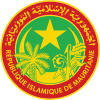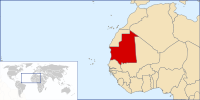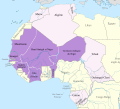Portal:Mauritania
The Mauritania Portal - بوابة موريتانيا
The country's name derives from the ancient Berber kingdom of Mauretania, located in North Africa within the ancient Maghreb. Berbers occupied what is now Mauritania beginning in the third century AD. Arabs under the Umayyad Caliphate conquered the area in the late seventh century, bringing Islam, Arab culture, and the Arabic language. In the early 20th century, Mauritania was colonized by France as part of French West Africa. It achieved independence in 1960, but has since experienced recurrent coups and periods of military dictatorship. The most recent coup, in 2008, was led by General Mohamed Ould Abdel Aziz, who won subsequent presidential elections in 2009 and 2014. He was succeeded by Mohamed Ould Ghazouani following the 2019 elections, which were considered Mauritania's first peaceful transition of power since independence. Mauritania is culturally and politically part of the Arab-Berber ethnicity, language, and culture. The remaining 30% of the population comprises various sub-Saharan ethnic groups .
Despite an abundance of natural resources, including iron ore and petroleum, Mauritania remains poor; its economy is based primarily on agriculture, livestock, and fishing. Mauritania is generally seen as having a poor human rights record, and is particularly censured for the perpetuation of slavery as an institution within Mauritanian society, with an estimation by the 2018 Global Slavery Index of about 90,000 slaves in the country (or 2.1% of the population). (Full article...) Selected article - The This is a
Good article , an article that meets a core set of high editorial standards.Souleymane Ould Chebal and Bounkou Camara, who were both selected by wildcards after both failed to meet either the "A" or "B" qualifying standards. Chebal was selected as the flag bearer for the opening ceremony. Neither of the Mauritanians progressed beyond the heats. (Full article... )
CategoriesGeneral images -The following are images from various Mauritania-related articles on Wikipedia.
Related portalsWikiProjects
Topics in Mauritania
Cities and towns
CommunesAssociated WikimediaThe following Wikimedia Foundation sister projects provide more on this subject:
Discover Wikipedia using portals | ||||||||||||||||||||||||||||||||||||||||||||||||||||||||||||||||











































